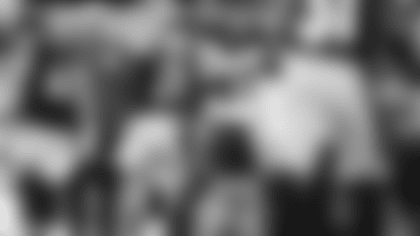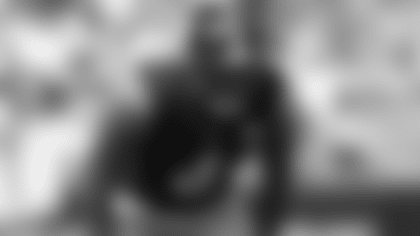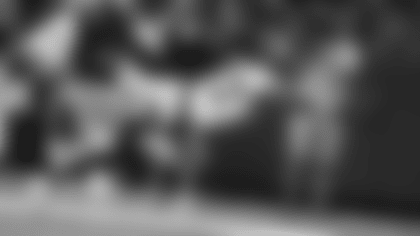Q. During your news conference on Tuesday, one of the things you said was, "So although we're playing good ball, it's still about us. It's still about how we function." Is that belief the reason why you have had the team practice in pads during each Wednesday of the regular season so far?
A. Absolutely. We're very much still developing in all areas. In expertise relative to the positions that we hold, technically, schematically, the overall things that we're trying to get done in all three phases, the cohesion associated with that, redefining and sharpening the division of labor. I think with each passing week, particularly with the new guys, we have a better understanding of what they're capable of, they have a better understanding of what they're capable of, and so we're getting more pointed in terms of the things that we're asking them to do. All of those things rolled into one mean that we're still very much in development, and pads are a component of that. This week, for example, we're playing an attacking, penetrating interior defensive front, which has been different than some of the things that we faced recently. And so, you need to carry pads, because those combination blocks happen a little bit differently when you're playing penetrators, as opposed to guys who read blocks. And so there's a lot of reasons why you carry pads. There's a lot of reasons why you work with an edge. The bottom line is we're still growing in a lot of ways.
Q. You have said you want Justin Fields focused on starting at quarterback when the week of preparation begins. What is Wednesday morning like for the starting quarterback?
A. He meets with me at 7 a.m. I always want to see the leaders first. I want to give them information prior to others getting it. It aids them in their leadership. The next time I talk in a team meeting at 8:30 it's the second time it's hitting their ear, and so they're able to digest it differently and thus lead and make the day a little bit more fluid for the collective. And that's an important meeting for us, meeting with the quarterbacks, talking about the things that are important, in terms of the base level game plan things, but also just the general things we're trying to get done on a Wednesday, all in an effort to elevate their leadership. Leadership is a part of his job, and it's my job to assist him in that. And a big assist comes just from information. So every Wednesday morning starts with a 7-8 a.m. meeting with me, talking about things, not only that we're trying to get done on Wednesday, but largely with the offense that week.
Q. About your on-going getting-to-know process with Justin, you mentioned part of that is challenging him to improve in all areas. How does that happen? Is it verbal?
A. It can be summarized in the phrase that I've been saying this week. "Don't allow routine to become routine." Those things that we do in the preparation process on any given day or the totality of the days. We do those routines because it positions us to win, so we can't be desensitized to that process. And so don't allow the routine to become routine, and that's what I mean when I'm saying Justin's capable of improving in all areas. He just needs to be so cognizant of everything that we do and engaged in it, and just cast a big net from an improvement standpoint. As we gain experience together and we see trends and things that need to be addressed, we will narrow that focus. But initially I just don't assume anything. We start with a broad net, and it gets more narrow as we step into more stadiums together, he and I.
Q. During games, how is the information passed to the players to get the proper personnel groups on the field and then communicate that same information to the guys on the field so they know who's supposed to be coming off the field?
A. It happens in a lot of ways. There are coaches who are capable of signaling from the sideline. There are players who are coming on the field who are potentially capable of carrying signals. Then there's also the coach-to-player component, where Arthur Smith communicates it to Justin in the huddle, and Justin has an opportunity to tell those in the huddle. And so there are several fail-safes, if you will, to make sure things get communicated.
Q. In talking about your offensive linemen, you mentioned the finish mentality. What does finishing mean?
A. Whether it's a play, a drive, a half, or a game, it's about leaning in on the finish of things and being an individual and a collective on the rise. Football is a competitive game from the first snap, but oftentimes the outcome of games aren't decided early. And particularly among the bigs, it's more of a war of attrition in the line of scrimmage for offense and defense. And so when you talk about the end of a game, you want to be able to end the game the way we ended the game last week, in terms of the running game. Or you want to be able to be conditioned enough, physically and mentally, to finish off a 12-to-15, play drive and get a touchdown as opposed to settling for a field goal. And so that finish component is a physical thing, but it's also a mental thing, in terms of a mindset and the ability to stay wired and execute through a series of events.
Q. Roman Wilson has been a full participant in practice for the last couple of weeks. Just in general, what are some of the challenges a rookie wide receiver has in adjusting from the college game to the game that's played at the professional level?
A. There's a lot, but I don't want to overstate it, because you see young wideouts transition into the NFL and perform at a high level every year. And specifically as it pertains to Roman, he got hurt on the sixth play of the first practice (in pads) of training camp. And so there are some developmental things, there are some physical plays and conditioning and learning and things that go into his process that are not reflective of the overall process. Roman doesn't have a whole lot of in-helmet experience to draw from. He's healthy, but he still has a lot of work ahead of him in terms of being game ready.
Q. Playing in tight games and doing what's necessary to win them. What does that do for a team beyond stacking numbers in the win-column?
A. I think there's growth in experience, and particularly when that experience can be positive, it aids into the buy-in. There's also growth in negative experiences, but it doesn't necessarily help the buy-in. When you can be faced with challenges and persevere and come out the other side of it, there's a warm and fuzzy feeling, individually and collectively, that aids you in facing the next challenges. Obviously there's growth in all circumstances, you win or you grow, as we say in our business, but growing while winning is optimally what we all seek.
Q. Is there a carryover from winning a close game to the next time you're faced with the same situation? Does a confidence foster itself within the players?
A. No question, because when you're dealing with an NFL collective, these guys come from a variety of backgrounds, and you better not assume people know how to win. And there's growth in experiencing winning and it becoming a normal state. That's one of the reasons why I love scouting the blueblood programs. Najee is used to winning. Winning is a normal state for him. The Georgia boys – Darnell, GP, Broderick, they're used to winning. It's a normal state for them. I like to do business with people who believe winning is a normal state. You come from a losing program, losing is a normal state. There's some things to overcome, from a mentality standpoint, from a fight standpoint, when you have that (losing) experience. Donte Jackson, for example, when we were in the locker room last week after a win (over the Chargers), he said, "I've won more games this year than I did all of last year." And it hits you like a lightning bolt. You can get used to winning. You can get used to losing. I prefer to get used to winning.
Q. How did the DeMarvin Leal experiment at outside linebacker come about, and what did he show you to give you some clues that it was something he could be able to do?
A. He's a uniquely talented "big." He's got good body control. He's a good athlete. He can run. He's also one of the few defensive linemen who's on the kickoff unit, and that speaks to what makes him an interesting animal. He's on our kickoff team. He's made two tackles in three weeks. He's a problem in that space, because he's a big you can't block below the waist on kickoff and things of that nature. And so that just speaks to his versatility. The more that you can do is something that we value. Here's a guy who's capable of playing D-line, he's capable of playing outside linebacker. He makes us big and strong in run circumstances when he's playing that position. He makes us really athletic in passing circumstances when he's rushing over a guard as a defensive lineman. And so those hybrid, talented athletes really help you. LaMarr Woodley was like that, and that's who DeMarvin kind of reminded me of, although his home position is D-line. He reminded me a lot of LaMarr Woodley.
Q. In terms of a challenge to a defense, how would you compare RB Jonathan Taylor – today's challenge – to RB J.K. Dobbins – last week's challenge?
A. His home run and long speed is much more significant than J.K.'s. Not that J.K. is not explosive, but I think some of the injuries he's had has minimized some of that. This guy, when he gets into your second and third levels, a 10-yard gain can turn into a 60-yard gain, and that's what makes him extremely dangerous. He's got a complete game. He's not a one-hit wonder. He's got pick-and-vision and patience. He's just a well-rounded running back, but that long speed is an X-factor. In a similar way as when you're facing Derek Henry, for a big man, his long speed is unique. And when he gets into the second and third levels, 10 yards can turn into 50 yards real quick. And so obviously, Mr. Taylor has our attention.
Q. You recently signed CB C.J. Henderson to the practice squad. What were some of the things he had or showed that made him the ninth overall pick of the 2020 NFL Draft?
A. He checked all the boxes. You're not a top 10 pick and hugging Roger Goodell (at the NFL Drafty), unless you've got some real measurables. He was 6-feet, 205 pounds. He ran extremely fast. His game tape was really impressive. He just had a well-rounded game. I don't know some of the things that transpired during the course of his career, but oftentimes in free agency, our interest is not based on what's transpired in terms of their professional careers, but it's going back to draft prep. That's why we were so excited about acquiring Patrick Queen, for example, or Donte Jackson. It's not about what Pat did in Baltimore, although we were really familiar with what he did in Baltimore, and the same with Donte, because we were preseason partners with Carolina. The draft prep component for us is big. We build our team primarily through the draft. We saw some things in draft prep that were attractive to us, and so it continues.
Q. Is the practice squad used as a way to give him an extended tryout, so to speak?
A. It goes even beyond that. Sometimes they're just placed there for an extended period of time until they can learn what to do, so that we can activate them. You know, James Pierre was on the practice squad for a short period of time, for example, because we're familiar with him, but we just wanted to make sure he was in shape. One week later, he's on our 53 man roster.
Q. Colts quarterback Anthony Richardson isn't a rookie because this is his second NFL season, but he doesn't have a lot of game experience, either in college or so far in the NFL. Generally speaking, what are some of the things an NFL defense might do in a game to take advantage of an inexperienced quarterback?
A. Inexperience doesn't necessarily dictate our approach in terms of a cookie cutter. There are some inexperienced guys who show experience beyond their years. Bo Nix, for example, is inexperienced in Denver, but he was a 6-year college player who had a career at Auburn and a career at Oregon. It's like he had two college careers. And so the inexperience component is not necessarily the end-all be-all, but in terms of guys who just are raw, you want to play a mental game with them, particularly when they're in one-dimensional circumstances. When they've got to throw it, you want to make them work. You want to play the cat-and-mouse game with them, if you will. You want to make them uncomfortable. And sometimes making them uncomfortable is not with physical things, it's the mental approach.














